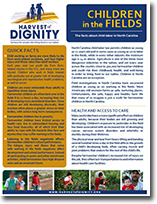Documentary Film Harvest of Dignity to be featured on PIC.tv
 Monday, August 15, 2011 at 10:50AM by
Monday, August 15, 2011 at 10:50AM by  Chris Liu-Beers
Chris Liu-Beers  FOR IMMEDIATE RELEASE
FOR IMMEDIATE RELEASE
CONTACT: Bart Evans, Coordinator, Farmworker Advocacy Network
919-660-0704 (o) | 510-366-1604 (c) | bdevans@duke.edu
Documentary Film Harvest of Dignity to be featured on PIC.tv
http://pic.tv/harvest
August 9, 2011, Raleigh, NC — “Most people don’t realize that young kids are picking blueberries for our pies, sweet potatoes for our casseroles and tomatoes for our salads,” said Emily Drakage of the Association of Farmworker Opportunity Programs. Drakage works with farm worker children and their families. “People should be able to feel confident when they buy North Carolina produce that they’re not enjoying it at the expense of a child’s health and safety.”
The Farmworker Advocacy Network and One Economy are proud to announce Harvest of Dignity, a new original documentary that provides an in-depth portrait of the people who harvest our food. Harvest of Dignity is exclusively featured online on One Economy’s Public Internet Channel, PIC.tv.
“One Economy’s Public Internet Channel provides online programs that engage, inspire and facilitate action,” said Daniel Fellini, executive producer, One Economy Corporation, “Harvest of Dignity is a film that addresses a relevant issue facing communities and we hope it will be a catalyst for thought, discussion and engagement.”
The Harvest of Dignity film comes on the 50-year anniversary of the acclaimed 1960 film Harvest of Shame, the last televised documentary by North Carolina-born journalist Edward R. Murrow that led to permanent changes in the laws protecting workers’ rights. The new film, Harvest of Dignity, combines interviews with North Carolina farmworkers, advocates, faith leaders and educators, documentary photos and interviews collected by Student Action with Farmworkers, and clips from the original Harvest of Shame documentary. Highlighting the struggles of farmworker families traveling the eastern migrant stream, the film compares conditions from 50 years ago and today and asks how much has changed.
“The good thing is that I haven’t gotten sick, right, because supposedly in this work many people get sick, from the tobacco and from the pesticides… They don’t tell us, but you can see that they are applying pesticides, or it smells like pesticides afterward. You can smell it when you enter the field, it smells of poison and you realize what is going on. And since the boss speaks English and you speak Spanish, you don’t understand much.”
–NC farmworker, 2010
This film was produced by Minnow Media in collaboration with the Farmworker Advocacy Network and Student Action with Farmworkers. The film is in Spanish and English with subtitles. FAN uses the documentary in its campaign to reform conditions for N.C. field and poultry workers. For more information about the Harvest of Dignity campaign, visit ncfan.org.
###
PARA PUBLICACIÓN INMEDIATA
CONTACTO: Bart Evans, Coordinador, Red de Defensa de Trabajadores Agrícolas
(Farmworker Advocacy Network-FAN)
919-660-0704 (oficina) | 510-366-1604 (celular) | bdevans@duke.edu
El documental Cosecha de dignidad será presentado en PIC.tv
http://pic.tv/harvest
9 de agosto de 2011, Raleigh, NC — “La mayoría de las personas no se dan cuenta que niños pequeños están cosechando arándanos para nuestros postres, camotes para nuestros guisos y tomates para nuestras ensaladas”, comentó Emily Drakage de la Asociación de Programas de Oportunidad para Trabajadores Agrícolas (AFOP). Drakage trabaja con hijos de campesinos y sus familias. “La gente debe sentirse segura de que cuando compra productos alimenticios de Carolina del Norte no es a expensa de la salud y seguridad de un niño”.
La Red de Defensa de Trabajadores Agrícolas (FAN) y One Economy tienen el orgullo de presentar Cosecha de dignidad (Harvest of Dignity), un nuevo documental original que ofrece un retrato detallado de las personas que cosechan nuestros alimentos. Cosecha de dignidad está siendo presentada exclusivamente por Internet en el Public Internet Channel (PIC.tv) de One Economy Corporation.
“El Public Internet Channel de One Economy ofrece programas por Internet que inspiran y fomentan participación y acción”, comentó Daniel Fellini, productor ejecutivo de One Economy Corporation. “Cosecha de dignidad” aborda un tema pertinente para miembros de la comunidad y esperamos que sea un catalizador para discusión, pensamiento y participación”.
El estreno de Cosecha de dignidad coincide con el 50º aniversario de Cosecha de vergüenza (Harvest of Shame), el cual fue transmitido por televisión en 1960 y fue el último programa del periodista de Carolina del Norte Edward R. Murrow. El documental ayudó a que se hicieran cambios permanentes a las leyes para proteger los derechos de trabajadores. El nuevo documental, Cosecha de dignidad, combina entrevistas con trabajadores agrícolas, defensores, líderes religiosos y educadores de Carolina del Norte con fotografías documentales y entrevistas recopiladas por Estudiantes en Acción con Campesinos (Student Action with Farmworkers - SAF) y fragmentos del documental original Cosecha de vergüenza. La película compara las dificultades de los trabajadores agrícolas que viajaban por la ruta de la costa este hace 50 años con la situación actual de los trabajadores y pregunta cuánto ha cambiado.
“Lo bueno es que no me he enfermado, la verdad, porque supuestamente mucha gente se enferma por este trabajo, por el tabaco y los pesticidas… No nos dicen, pero puedes ver que están rociando pesticidas o hueles los pesticidas después. Puedes olerlo cuando entras al campo, huele a veneno y te das cuenta de lo que está pasando. Y como el jefe habla inglés y tú hablas español, no entiendes mucho”.
–Trabajador agrícola en Carolina del Norte, 2010
El documental fue producido en español e inglés con subtítulos por Minnow Media, en colaboración con FAN (Red de Defensa de Trabajadores Agrícolas) y Estudiantes en Acción con Campesinos (Student Action with Farmworkers). FAN utiliza el trabajo documental en su campaña para reformar las condiciones de los trabajadores de campo y de la industria avícola en Carolina del Norte. Para mayor información sobre la campaña Cosecha de dignidad, visite ncfan.org.
###
 child labor,
child labor,  labor conditions,
labor conditions,  wages in
wages in  Press Release
Press Release 











